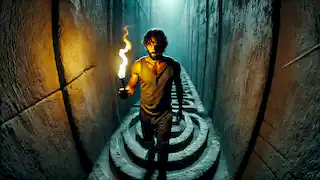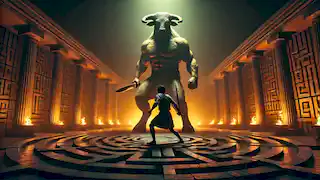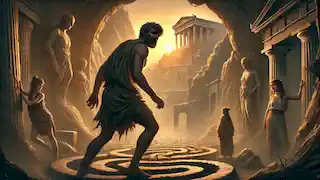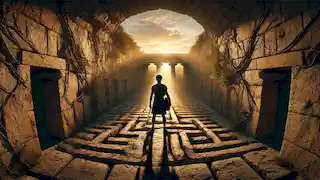In the ancient world, where myth and history blurred into one, there existed a palace so vast, so grand, and so mysterious that it became the epicenter of a legend. This was the Palace of Knossos, a sprawling complex perched upon the island of Crete, whose walls once echoed with the footsteps of kings, gods, and monsters. Deep within the twisting corridors of this palace was a labyrinth so intricate that no one who entered could find their way out without guidance. It was said that at the heart of this maze lived a beast, half-man, half-bull, known as the Minotaur. To the Greeks, the labyrinth was not just a maze of stone and mortar but a test of the soul, a reflection of the complexities and contradictions of the human heart. In the golden light of a Cretan sunrise, young Theseus stood at the edge of the labyrinth. His heart pounded in his chest as he stared into the yawning darkness of the entrance. It was a gaping maw, and the faint flicker of torchlight inside seemed to dance like the souls of those who had perished within its walls. Behind him, the people of Athens awaited the outcome. Their king had sent Theseus to Crete as part of a terrible bargain with King Minos, ruler of the island. Every year, seven young men and seven young women from Athens were sent into the labyrinth as a sacrifice to the Minotaur. Theseus had volunteered himself for this year's journey, determined to end the bloodshed once and for all. He was determined to slay the beast and free his people from the tyranny of this horrendous pact. Yet, as he stared into the labyrinth, the weight of his task began to sink in. Princess Ariadne, daughter of King Minos, approached him silently, her eyes filled with both fear and hope. She held out a ball of thread. "Take this," she whispered, her voice barely audible over the murmur of the crowd. "It will guide you. Tie one end to the entrance and unravel it as you go. That way, you will always find your way back." Theseus took the thread from her hands, his fingers brushing against hers briefly. Their eyes met, and for a moment, the terror of the labyrinth was forgotten. "Thank you," he said softly, before stepping into the darkness. The labyrinth was cold, damp, and utterly silent. As Theseus moved forward, the sound of his footsteps echoed off the walls, magnified by the eerie stillness. The flickering light of his torch cast long, shifting shadows, making the stone walls seem to writhe and move around him. He tied one end of the thread to a rock near the entrance and began to unravel it as he made his way deeper into the maze. The further he went, the more oppressive the atmosphere became. It was as though the walls themselves were closing in on him, narrowing the passages, forcing him into ever smaller and darker corners. The air was thick with the scent of damp earth and decay. Theseus could hear the faint drip of water somewhere in the distance, but there were no other sounds—no signs of life. He knew, however, that the Minotaur was in here somewhere, lurking in the shadows, waiting for him. Hours passed. The maze twisted and turned in ways that defied logic. Every corridor seemed identical to the last, every intersection indistinguishable from the ones that had come before. Without the thread, Theseus knew he would have been hopelessly lost by now. The labyrinth was not just a physical maze—it was designed to confuse, to disorient, to break the spirit of those who dared enter. Suddenly, a low, guttural growl echoed through the corridor, sending shivers down Theseus' spine. He froze, his hand tightening around the hilt of his sword. The sound had come from somewhere ahead, but in the twisted acoustics of the labyrinth, it was impossible to tell exactly where. The Minotaur was close. The air grew heavier, thick with the scent of blood and something far fouler. Theseus pressed on, his senses heightened, his every movement deliberate and cautious. He turned a corner and froze. Before him stood the Minotaur. The creature was enormous, its muscular frame dwarfing even the tallest of men. Its bull-like head swung from side to side, snorting, as though it could already smell the blood of its next victim. Its eyes were filled with a primal fury, and its horns gleamed in the dim light of the torch. For a moment, neither man nor beast moved. They were locked in a deadly dance, each waiting for the other to make the first move. Then, with a deafening roar, the Minotaur charged. Theseus barely had time to react. He leapt to the side as the beast's horns grazed his arm. The pain was sharp and immediate, but he had no time to dwell on it. He rolled to his feet and swung his sword in a wide arc, aiming for the Minotaur's exposed side. The blade connected with a sickening thud, and the beast let out a howl of pain. Blood splattered the walls of the labyrinth as the Minotaur staggered back, momentarily stunned. But it was not defeated yet. With another roar, it lunged at Theseus again, its massive fists swinging wildly. Theseus dodged and weaved, his sword flashing in the dim light. The battle was brutal, each blow more desperate than the last. The labyrinth seemed to close in around them, the walls echoing the sound of clashing steel and the beast's enraged roars. Finally, with a swift and precise strike, Theseus drove his sword into the Minotaur's heart. The creature let out one last, mournful bellow before collapsing to the ground in a heap. Its blood pooled on the stone floor, dark and viscous. Breathing heavily, Theseus wiped the sweat from his brow and retrieved his thread. The labyrinth was still as silent as ever, but now, it felt less oppressive. The beast was dead. With the Minotaur defeated, Theseus began the long journey back through the labyrinth. He followed the thread carefully, retracing his steps through the twisted corridors and narrow passages. His body ached from the battle, and every step felt heavier than the last, but he pressed on. The labyrinth, once a place of terror and confusion, now felt almost peaceful. The flickering torchlight seemed less threatening, and the air, though still damp and cold, felt lighter. Theseus could sense that he was getting closer to the entrance. The thread led him ever forward, a lifeline in the darkness. After what felt like hours, he saw a faint glimmer of light ahead. His heart leapt in his chest as he quickened his pace. The entrance was near. When Theseus finally emerged from the labyrinth, the sun was high in the sky, casting a warm, golden light over the palace. The people of Athens, who had been waiting anxiously for his return, erupted into cheers. Princess Ariadne was among them, her eyes shining with relief and joy. "You did it," she whispered as Theseus approached her. He smiled, exhausted but triumphant. "The Minotaur is dead," he said simply. With the death of the Minotaur, the cruel pact between Athens and Crete was broken. Theseus had saved his people, and he had done so with the help of Ariadne's thread, a symbol of hope and guidance in the darkest of places. But the story of Theseus and the labyrinth does not end with the death of the Minotaur. For with every victory, there comes a price. As Theseus and Ariadne sailed away from Crete, leaving the labyrinth and its dark history behind, fate began to weave a new thread. On the island of Naxos, Theseus made a choice that would haunt him for the rest of his life. He left Ariadne behind, abandoning her on the shores while he continued his journey to Athens. Why he did this is a mystery that has puzzled historians and mythologists for centuries. Some say it was the will of the gods, others claim it was a moment of weakness or doubt. Ariadne's abandonment was a cruel twist of fate for a woman who had risked everything to help Theseus. But her story did not end in despair. According to legend, she was found by the god Dionysus, who made her his immortal bride, lifting her from the depths of betrayal to the heights of divinity. Theseus, meanwhile, returned to Athens a hero, but his victory was tainted by sorrow. As he approached the city, he forgot to change the black sails on his ship to white, as he had promised his father, King Aegeus. Seeing the black sails from afar, Aegeus assumed that his son had perished in the labyrinth and, overcome with grief, threw himself from the cliffs into the sea. Thus, Theseus' triumph was marred by tragedy. He had slain the Minotaur, freed his people from the horrors of the labyrinth, and ended the bloodshed. But in doing so, he had lost both the woman who had saved him and the father who had loved him. Theseus would go on to become a great king, but the shadow of the labyrinth would follow him for the rest of his life. It was a reminder that even the greatest victories come with a cost, and that sometimes, the hardest battles are not fought in the dark corridors of a maze, but in the heart and soul of a man. The labyrinth of Knossos became a symbol of human struggle and resilience, a reminder of the delicate balance between order and chaos, light and darkness. The legend of Theseus and the Minotaur was passed down through the ages, retold by poets and scholars, inscribed on pottery and carved into stone. But the true labyrinth, the one that lies deep within each of us, remains the greatest mystery of all. It is a maze of choices and consequences, of hopes and fears, of love and loss. And, like Theseus, we each carry our own thread, a lifeline that guides us through the twists and turns of our journey. The story of the labyrinth of Knossos is not just a tale of heroism and monsters. It is a story about finding our way, about the courage to face the unknown, and about the strength to keep moving forward, even when the path is unclear. And in the end, perhaps that is the greatest lesson of all. {{{_04}}}The Call of the Labyrinth

Into the Maze
The Beast Unleashed

The Escape
The Price of Victory

Return to Athens
Epilogue: The Legacy of Knossos
The Story of the Labyrinth of Knossos
Reading Time: 9 min

About Story: The Story of the Labyrinth of Knossos is a Myth Stories from greece set in the Ancient Stories. This Dramatic Stories tale explores themes of Courage Stories and is suitable for All Ages Stories. It offers Moral Stories insights. A tale of courage, love, and the labyrinth’s dark secrets.

















